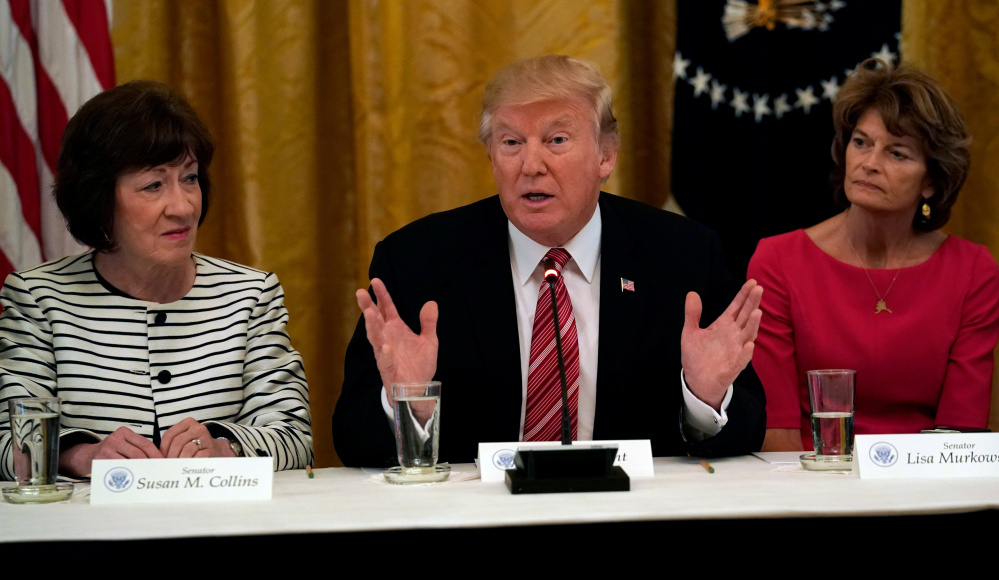WASHINGTON — Two months after a group of 13 male Senate Republicans began crafting their legislation to dismantle the Affordable Care Act, experts say the bill would disproportionately hurt women in a variety of ways.
“The bill has huge implications for women’s health,” said Usha Ranji, associate director of women’s health policy at the Kaiser Family Foundation. “It raises the question of what health insurance really is.”
The bill would slash Medicaid, which pays for half of all childbirths in the United States and whose beneficiaries are 58 percent women.
It would allow states to apply for waivers for 10 essential health care benefits, including maternity care. And it would defund Planned Parenthood for one year, a group that provides basic reproductive health care and cancer screenings to a client base that is nearly 90 percent women.
The legislation’s impact on women already may be a key factor in whether it eventually gets through Congress’ upper chamber. With Democrats united in opposition to the bill, Senate Majority Leader Mitch McConnell can only afford to lose one vote among the body’s 52 Republican members to maintain a majority. He was forced this week to delay a vote on the bill because of nonsupport within his ranks.
Five Republican senators are women, and three have said they won’t support the bill as it is now. Maine Sen. Susan Collins took to Twitter on Tuesday to say she’d vote no, citing deep Medicaid cuts hurting the “most vulnerable Americans.”
“I want to work w/ my GOP and Dem colleagues to fix the flaws in ACA,” she tweeted. “CBO analysis shows Senate bill won’t do it.” Collins also told ABC’s George Stephanopoulos on “This Week” that “it makes absolutely no sense to eliminate federal funding for Planned Parenthood.”
West Virginia Sen. Shelley Moore Capito said in a written statement Tuesday that “as drafted, the Senate health care bill is not the right fix for West Virginia, and I cannot support it.”
And Alaska Sen. Lisa Murkowski told CNN that she “didn’t have enough information” to vote for the bill, but as a supporter of Planned Parenthood, she emphasized “concerns” about cutting Medicaid funding to the organization.
As Republican senators return home for the July 4 recess this weekend, many will likely face questions and even protests from voters about the bill’s impact on care for the disabled — similar to a protest this week inside the U.S. Capitol that saw police pulling people out of their wheelchairs.
About two-thirds of those caring for older adults and disabled family members are women, according to the AARP and the National Alliance for Caregiving.
The Senate’s other two Republican women, Sens. Deb Fischer of Nebraska and Joni Ernst of Iowa, haven’t publicly taken firm positions on the bill. Ernst sent an email poll to her constituents on Sunday, asking them whether they favored the legislation, while she has said she’ll study the bill and its effects.
In the House, 18 of the chamber’s 21 Republican women supported House Speaker Paul Ryan’s American Health Care Act, the Obamacare repeal bill that passed the lower chamber in May and contains many of the same provisions as the Senate bill.
Rep. Diane Black, R-Tenn., was one of the “yes” votes, but she said Thursday she didn’t know about the Senate bill’s impacts on women.
“I guess I haven’t thought about it in quite that narrow perspective,” said Black, who shepherded the bill through the House Budget Committee, which she chairs. “I don’t know that there weren’t women involved in the drafting of the bill. That’s an assumption … but I wasn’t there, so I’m not really sure.”
Hadley Heath Manning, director of policy at the conservative Independent Women’s Forum in Washington, D.C., said “groups in opposition are going a little too far” with their criticism, and while “it’s fair to say the bill we’re looking at now is imperfect,” it’s a step in the right direction.
“There’s a lot to consider when talking about women’s health and reform,” Manning said. “We believe that women will continue to have access to the coverage they need.”
Implementing the bill would cause about 22 million more Americans to lose insurance during the next 10 years, according to the nonpartisan Congressional Budget Office’s analysis.
This could partially be because of slashed Medicaid funds, which critics say will hit women the hardest, as the program’s enrollees are 58 percent women or nearly 40 million, according to the Kaiser Family Foundation.
“It should really be called the Worse Care Act,” said Janel George, deputy director of federal reproductive rights and health at the National Women’s Law Center in Washington, at a joint news conference on Friday.
“This bill purports to fix our health system, but it does nothing more than devastate women’s access to quality health care.”
Send questions/comments to the editors.



Comments are no longer available on this story